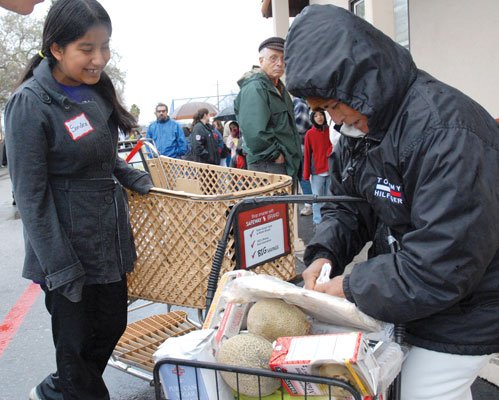Turkeys aren’t necessary to enjoy the holiday season, but they
certainly add Christmas cheer. Thanks to the generosity of Gilroy
and surrounding communities, many low-income South County families
now have a turkey for their Christmas table.
By Leigh Lawson
Turkeys aren’t necessary to enjoy the holiday season, but they certainly add Christmas cheer. Thanks to the generosity of Gilroy and surrounding communities, many low-income South County families now have a turkey for their Christmas table.
More than 700 families in need lined up at St. Joseph’s Family Center Monday and Tuesday and took home turkeys and a Christmas basket filled with food.
St. Joseph’s Family Center in Gilroy is a community outreach center that provides food, supplies and services to low-income families. In November, 720 families signed up for holiday food, with 100 additional families tacked on a waiting list.
Between Thanksgiving and Christmas, St. Joseph’s asked the community to donate 750 turkeys. The response was phenomenal.
“A lot of people drove up with cases of food this year,” said Vicky Martin, food pantry coordinator at St. Joseph’s Family Center. “I think the community was really aware of the need this year and really came through.”
Despite the recession, Martin said community members donated a total of 850 turkeys, 100 more than the center had asked for. So many turkeys were donated, the center will be able to hand out turkeys to families on the waiting list, Martin said. “That’s an unusual year.”
The turkeys were kept in two walk-in freezers, with one freezer stuffed floor-to-ceiling with turkeys and the rest overflowing into the second freezer.
Many more people are coming to the community center for help than last year, Martin said, evidenced by new families signing up every week. Even though the news reports the economy is turning around, Gilroy isn’t seeing evidence of it, she said.
“There are little signs of hope, here and there. Mi Pueblo Market opened up, so did the Grocery Outlet,” she said. “Overall, a lot of people are out of work, and if they are in work, it’s part-time and they still need our services. Demand is very high.”













